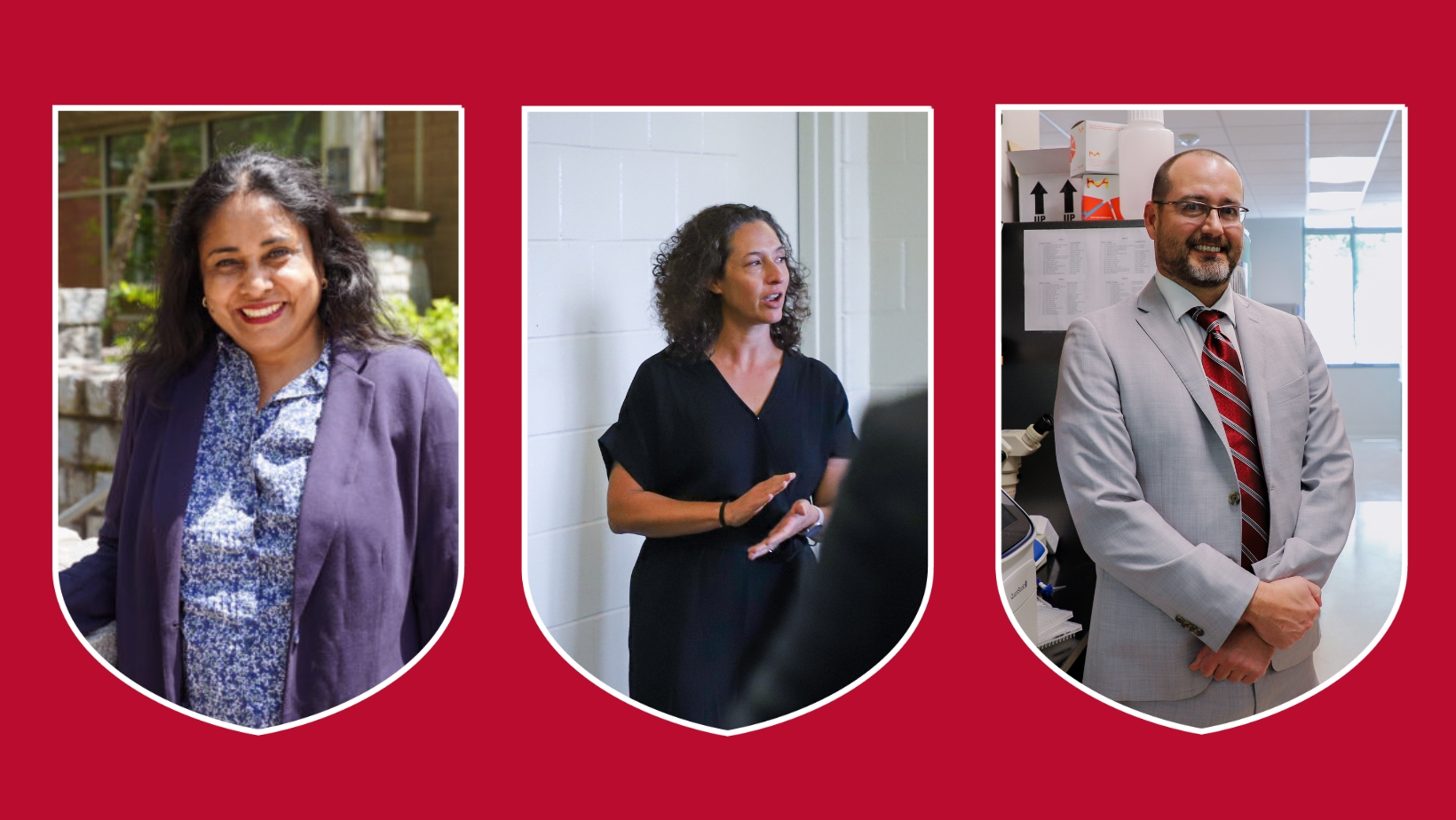What makes a professor distinguished?
In the College of Veterinary Medicine, it’s a clinician who sees the need for 24/7 emergency care for animals and builds a program to provide just that. And it’s researchers who dive deep into the mechanisms of well-known but little understood diseases in hopes of minimizing their effects on future generations and, possibly, themselves.
Three CVM faculty members were named distinguished professors in 2023, a recognition of their exemplary work in their respective fields and a promise of great achievements to come.
Dr. Kira Epstein, Snyder Distinguished Professor in Large Animal Medicine and Surgery
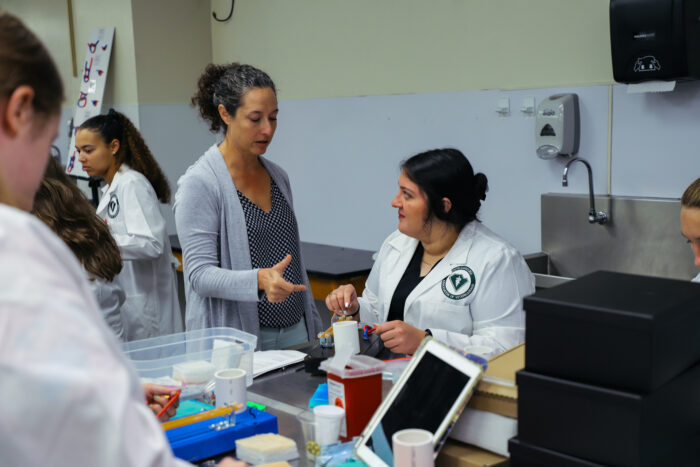
Dr. Kira Epstein teaching first-year DVM students during their first clinical skills lab.
Department Head of Large Animal Medicine
UGA Veterinary Teaching Hospital
Kira Epstein came to veterinary medicine through a process of elimination. She acknowledges that the horseback riding lessons she started at age 7 are “probably what got me into this trouble of being an equine veterinarian.”
But it wasn’t until college that a career caring for horses occurred to her, and even then, it took a little prodding from her mother to set her on that path. She had to overcome her squeamishness first and took a couple of jobs working for veterinarians to prove to herself that she could handle the good, the sad and the messy.
“I didn’t know I wanted to be a veterinarian, unlike many others do, from the time I was a small child. I decided sometime during college that the path that I thought I was going to take wasn’t right for me because it was too – frankly – humanities based and not enough science.”
Despite trying several times throughout her life to get out of the horse business, Epstein still rides competitively as a sideline to her role as professor of large animal emergency medicine, surgery, and critical care. She kept the habit while doing her undergraduate work at Princeton University, while earning her DVM at the University of California at Davis, and as a resident in surgery at University of Pennsylvania’s New Bolton Center. She made the transition from resident to faculty when she joined UGA’s CVM and continued her advanced training completing a fellowship in emergency and critical care here, with horse in tow.
She came to UGA in 2006 tasked with introducing and establishing an emergency service in the large animal hospital.
“I like building things and changing things. Not changing for the sake of changing but I like developing things and looking for ways to improve,” she says. “The fact that I got to build the service was somewhat unique and now there are three of us and we have trainees and we’ve expanded to be a 24-hour service.”
She was awarded the Snyder Distinguished Professorship in 2023 thanks to a historic gift to the Large Animal Department. Paired with matching provost funds, the donation will provide long-term funding to support the individual in the professorship and the department.
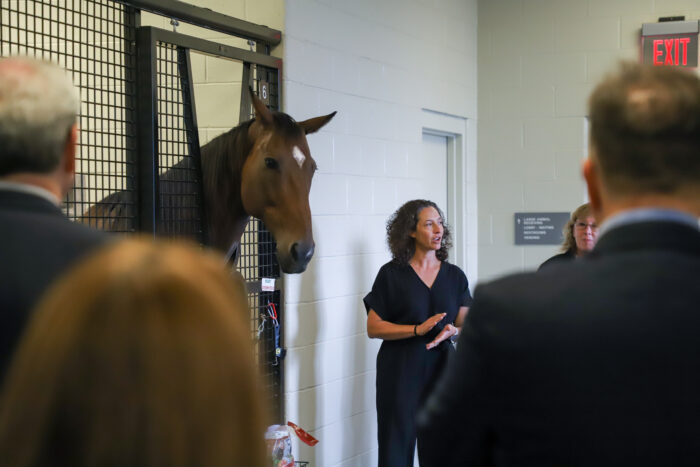
Dr. Epstein speaking to a tour group of UGA administrators at the VTH.
“I don’t know that I ever really expected to be in a professorship,” Epstein says. “I think it’s really exciting that we have those opportunities and the availability of the funds to be able, in my role as department head, to help with things in the department and for me personally to be able to continue some of the interests I have in research and also my professional development.”
While her heart is fullest when teaching and serving in the hospital, that work has sparked questions that led to research. “I have always tried to explore clinically relevant questions and topics related to what I do, so emergency and critical care and surgery.”
Her research has focused on colic in horses and surgically related issues from techniques to complications to post-operative treatment. One ongoing project is looking at drugs used to decrease hemorrhage in human and veterinary medicine and determining if they’re working, how they’re working and why they’re working in horses.
How does she do it all?
“I don’t want to not do it, so I figure it out,” she says. “I very much enjoy being a veterinarian, and I’m not ready to give that up. Particularly an academic veterinarian. I like clinical teaching of students, interns, and residents. I really like being a part of their development and training.”
Arthi Kanthasamy, Ph.D., Johnny Isakson Distinguished Professorship
Jason Richardson, Ph.D., Dianne Isakson Distinguished Professorship
Department of Physiology and Pharmacology
Isakson Center for Neurological Disease Research
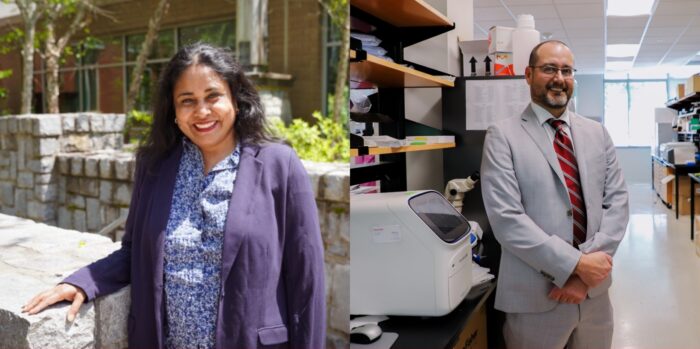
Arthi Kanthasamy (left) and Jason Richardson (right)
The University of Georgia’s College of Veterinary Medicine is on the forefront of research into neurological diseases such as Parkinson’s and Alzheimer’s thanks to the generous financial support of the Isakson Foundation. That support has allowed the college to bring on board leaders in this field of research.
A $1.4 million gift from the foundation last year established two distinguished professorships in the Isakson Center for Neurological Disease Research. Arthi Kanthasamy was awarded the Johnny Isakson Distinguished Professorship. Jason Richardson was awarded the Dianne Isakson Distinguished Professorship.
Created by the late U.S. Sen. Johnny Isakson, R-Ga., and his wife, Dianne, the foundation carries on Isakson’s commitment to biomedical research. Isakson retired from Congress following a diagnosis of Parkinson’s disease, and later died of the disease.
Richardson makes note of Isakson’s record of support for biomedical research and the legacy his foundation will create by helping UGA address “a public health emergency” presented by an aging population and an accompanying increase in diagnoses of Parkinson’s and Alzheimer’s in the coming years.
“It’s a very unique opportunity that we have here at UGA to make a significant impact in that area,” Richardson says.
Richardson has a personal stake in his own research. “I grew up in a rural environment. I grew up farming. I grew up drinking well water. Those are all risk factors for Parkinson’s. Pesticide exposure, certainly that as well,” he says.
His lab at Rutgers University in New Jersey was among the first to identify DDT (dichloro-diphenyl-trichloroethane) as a risk factor for Alzheimer’s disease. DDT was manufactured to combat insect-borne diseases such as malaria and typhus, for control of boll weevils in cotton, for insect control in livestock production, and for residential, institutional, and commercial pest control. The United States banned the use of DDT in 1972, but other nations still use it for mosquito control and crop protection. One of the last U.S. manufacturers of DDT was located in Georgia.
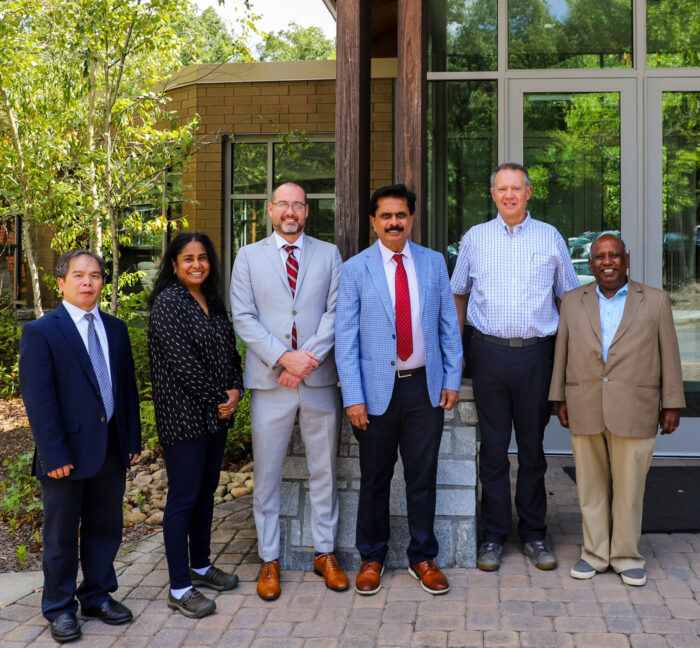
Kanthasamy & Richardson pictured with CVM colleagues at the Isakson Center for Neurological Disease Research. (left to right) Shaolin Liu, Arthi Kanthasamy, Jason Richardson, Anumantha Kanthasamy, Gregory Phillips, and Vellareddy Anantharam
UGA researchers discovered the link between chlorpyrifos, a synthetic successor to DDT, and Parkinson’s by accident, Kanthasamy says. “We didn’t anticipate this, we just thought, ‘let’s examine this mechanism.’” The group modeled their finding in cell cultures and mice. Soon after their discovery was published, a separate human study showed that people exposed to the pesticide chlorpyrifos exhibit Parkinson’s-like symptoms.
It is corroborative findings like these that appeal to Kanthasamy as a researcher funded by Isakson’s foundation. “I admire his ideals, Isakson, our senator,” she says. He was known for embracing bipartisan discussions of the problems before Congress, encouraging both sides of the political spectrum to work in a unified manner.
“I was motivated by this. This is the same issue in science. I have my opinion, you have your opinion, so we cannot come to a unified agreement. In science we cannot do that, but still, we can work with other researchers to broaden the field,” she says.
And so, the widening scope of research that is identifying risk factors for Parkinson’s and Alzheimer’s is creating an opportunity to intervene with vulnerable populations before diagnosis. Currently, a clinical diagnosis of Parkinson’s is made after a patient has lost 60 to 70 percent of dopamine neurons in the brain. Dopamine is a neurotransmitter responsible for memory, movement, motivation, mood, attention and more, thus accounting for the hallmark symptoms of tremors, memory loss, and depression.
Further research into the way pesticides affect humans may allow the kind of personalized or precision medicine used in cancer treatment.
“We try to look at how a person’s genetics modify their response to a pesticide and how that leads to disease,” Richardson says. “If we know who’s at risk, know then they’ve been exposed, understand how those pesticides are working then we may want to give that person a different treatment than someone who might not have been exposed.”
It’s a phenomenon that happens frequently in clinical trials for new drugs. The trial as a whole might be deemed a failure because the medication didn’t work on all participants, but certain individuals may have actually found relief.
“There’s not going to be one magic bullet for any of these because each person is different,” Richardson says. By understanding why some respond better to certain treatments, future interventions can be tailored in a way to slow down the progression of the disease.
Kanthasamy is working a second path that has identified biomarkers related to neuroinflammation. A major malfunction of the brain and immune system, neuroinflammation is thought to be involved in the progression if not the initiation of Parkinson’s and possibly Alzheimer’s as well.
The ability to detect these changes through minimally invasive testing can help predict someone’s risk for developing these diseases and allow earlier medical intervention.
The Isakson Distinguished Professorships will allow Kanthasamy and Richardson the opportunity to continue their cutting edge research on neurodegenerative diseases, and could eventually lead to larger grants from organizations like the National Institutes of Health (NIH).
To donate to these professorships funds, or in support of the College of Veterinary Medicine’s mission, please see the links below.
Snyder Distinguished Professor in Large Animal Medicine and Surgery Fund
Johnny Isakson Distinguished Professorship Fund
Dianne Isakson Distinguished Professorship Fund
